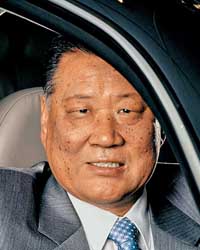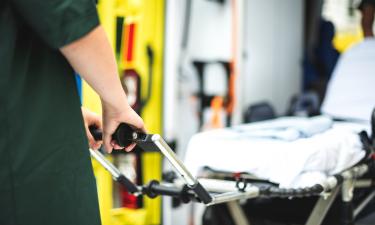Hyundai chief convicted on all charges, sentenced to three years in prison
Hyundai Motor Co. Chairman Chung Mong-koo was convicted Monday of embezzlement and other charges and sentenced to three years in prison over a slush fund scandal that has weighed on the world's sixth-largest automaker.

Prosecutors, who have been taking a hard line on corruption in South Korea, last month sought a six-year jail term, calling Chung's alleged crimes "grave."
But Judge Kim Dong-oh said the lesser sentence was justified because of Chung's "big contributions to the development of the country's economy" and noted his involvement in charity to atone for his actions.
Still, Kim said Chung's actions were "clearly criminal acts" that "greatly undermined the transparency and soundness of business management and had many adverse effects on our business culture."
Chung plans to appeal the verdict.
"We are greatly disappointed by the court's ruling and it is Chairman Chung's intention to file an appeal," Hyundai Motor said in a statement.
Chung "retains full operational control and decision-making authority," it said, adding that Hyundai Motor said its domestic and overseas operations "will continue to function as normal."
The 68-year-old Chung will remain free for the time being and doesn't face immediate detention. He missed more than two months of work after being jailed following his April arrest and entering a hospital for a health exam. He was granted bail in June and returned to work in July.
The company appeared to flounder in his absence. Key decisions about overseas plant construction involving both Hyundai Motor and its affiliate Kia Motors Corp. were delayed. Labor problems involving Hyundai's strike-prone labor union were also left to fester.
Chung had apologized for his actions and his lawyers argued he be given a suspended sentence meaning he would not actually serve prison time unless involved in other crimes.
Three other Hyundai officials facing similar charges were also convicted but all were given suspended sentences.
It is questionable whether Chung will actually serve the prison term as appeal courts have often granted more lenient sentences than the lower court rulings in cases involving business tycoons.
In 2005, Chey Tae-won, CEO and Chairman of South Korea's leading oil refiner, SK Corp., had the three-year prison term he received for accounting irregularities suspended by the Seoul High Court.
Chung appeared tight-lipped and grim as the verdict was read and walked silently from the courtroom after the hearing ended. Hyundai officials who packed into the room for the hearing also were silent.
Prosecutors said Chung illegally raised a 103.4 billion won (US$110.4 million, Ђ85.1 million) slush fund from affiliates from which authorities say he spent 69.6 billion won (US$74.3 million; Ђ57.3 million) for private and other purposes, including payments to lobbyists for government favors.
He was also convicted for inflicting financial damage on affiliates through questionable deals and arrangements that allegedly protected or boosted the financial interests of him and his son, Eui-sun, who heads Kia Motors, the country's second-largest carmaker. The younger Chung did not face trial.
The senior Chung had pleaded for leniency, apologizing at an earlier hearing for "causing trouble over this case" and pledging to make Hyundai the world's No. 5 automaker if given the chance.
"I think it was appropriate that he was found guilty of all those charges," said prosecutor Chae Dong-wook, who added that prosecutors will "decide later whether to appeal" the court's decision to impose a lighter sentence.
As of the end of 2005, Hyundai and Kia formed the world's No. 6 automaker in both production and sales, according to Automotive News, a publication that tracks the global vehicle industry.
Shares in Hyundai Motor ended unchanged at 69,800 won (US$75; Ђ58) after falling as much as 3.2 percent. Traders had expected a more lenient suspended sentence.
Analysts acknowledged the company's image could suffer from the guilty verdict. But with the appeals process expected to take up to a year and Chung still in charge, overall damage to the company was seen as limited.
"He'll still be able to run the company," said Anthony Moon, an auto analyst at Nomura International in Seoul. "I don't think there will be any immediate impact."
Hyundai Motor and Kia Motors together account for more than 70 percent of South Korea's automobile exports. Auto exports account for about of 10 percent of the country's total, reports AP.
Founded in 1967, Hyundai Motor was formerly part of the massive Hyundai conglomerate founded by Chung Mong-koo's father which at one time was South Korea's largest business empire. In the aftermath of the 1997-98 Asian financial crisis, the conglomerate broke up into several smaller groups.
Subscribe to Pravda.Ru Telegram channel, Facebook, RSS!





